There and Back: A Tale of Two Decisions
Ernest N. Braun
I have always known that I was a descendant of that small but infamous group who returned from Paraguay after leaving Manitoba. The term for us, Rückkehrer (returnees), was used with cruel intent for an entire generation, ridiculing those who emigrated in the 1920s only to return shortly thereafter.1
This reflection will be an addendum to the usual 1920s emigration narrative, a minority report of two decisions: one, to sell everything our family had in Manitoba to avoid compromising our faith in the 1920s, and the other, even more significant, to jettison everything in Paraguay a few years later to return to Manitoba and face that compromise.
I want to address the polarization that occurs within a group of people when a question of ideals separates them. This had also happened with the 1870s emigration from tsarist Russia, as well as earlier migrations across northern Europe. In each case it took the shape of all kinds of negative interplay between the ones who felt they needed to emigrate to preserve their values, and those who felt they could adapt. In the 1920s in Manitoba and Saskatchewan, the same polarization played out between the more liberal Mennonites and the conservative ones, dividing families and communities. Those who emigrated were denigrated by those who stayed, and vice versa.
Then, when a year or two later some of the emigrants returned, the situation repeated itself. Now they were characterized as weaklings or even cowards in the face of the hardships of pioneering by those who stayed to tough it out in the new land, and back in Manitoba they were ridiculed for not being able to live up to the high principles they professed.
My Braun family’s decisions placed them in a no man’s land. In the early 1920s, they were key figures in the earliest emigration movement, but by 1929 they belonged to neither camp: not to the group that stayed in Manitoba, nor to the group that remained in Paraguay.2 Those two decisions were to have repercussions far beyond those immediately foreseen.
First Decision
It all started as the school and language debate escalated after the First World War, when my great-grandfather Braun lost faith in the Canadian government and became a vocal exponent of emigration. His daughter-in-law, my grandmother, a strong-minded, vivacious woman, likewise refused to stay in Canada where the school would now be used to assimilate them as British citizens and would prepare her sons for the military, instead of preparing them for an agrarian and communal life shaped by the Sermon on the Mount. It was too much to sacrifice, once it became clear that another country would take them on acceptable terms.
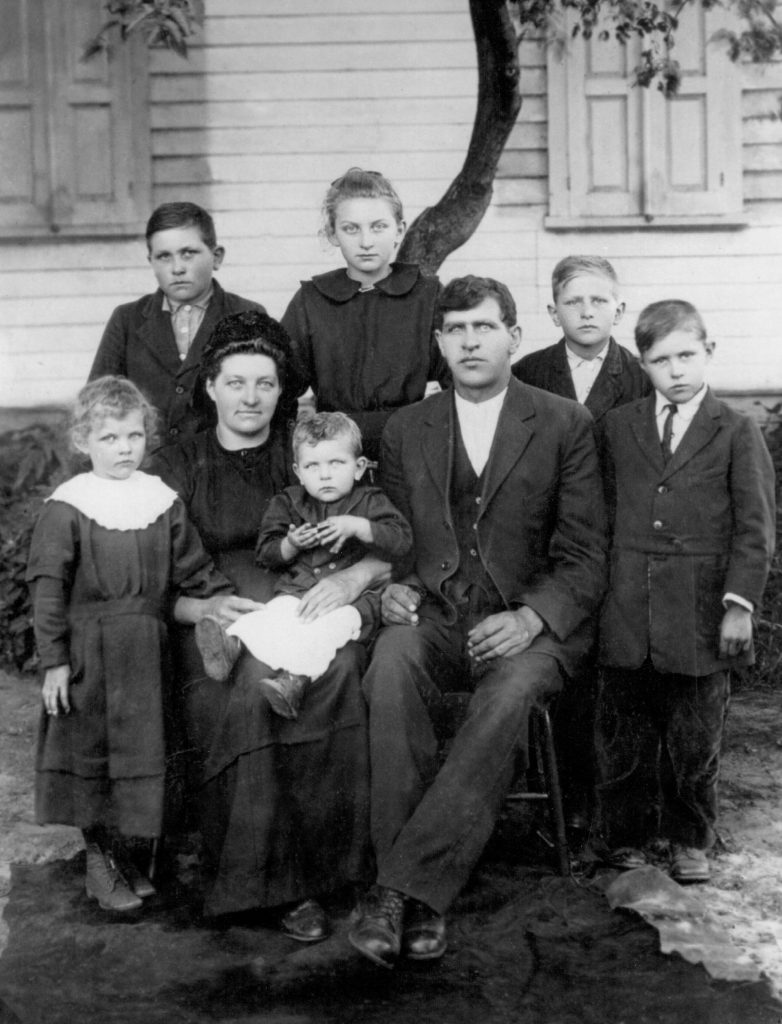
In 1921, 65 percent of the Chortitzer Mennonites on the East Reserve decided to emigrate, but a series of factors beyond their control postponed the actual emigration by about four years.3 The entire emigration movement had been entrusted to General Samuel McRoberts, an American financier. He had made the original link to Paraguay and offered to fund and organize the land exchange. But a severe economic crisis struck all of North America in late 1921 and he postponed his offer indefinitely. However, the emigration was in motion and before it became clear that the move was not going to happen any time soon, the Brauns had already sold everything. The delay hit our family particularly hard, unlike the others who sold their land later in 1926.
That first decision had two parts: emigration and immigration, each with financial and human costs. Emigration meant liquidating all material assets and leaving everything familiar for the unknown. Immigration meant encountering the unknown for good or ill.
Emigration for my grandfather Jacob Braun was particularly devastating. He was a successful farmer and partner in a threshing outfit when at thirty-five his farmstead in Alt-Bergfeld was sold lock, stock, and barrel to Winnipeg druggist William McCullough in a package sale of the entire village.4 Grandpa resisted strongly, because he really did not want to emigrate, but as his parents and his wife did, he resigned himself to it. When the emigration was delayed, Grandpa was forced to construct a temporary house and barn in primitive fashion near the village. By selling garden produce and digging seneca roots, his family avoided spending their capital, knowing they would need it for their new start in Paraguay.
By 1925, things improved, and McRoberts renewed his offer. Finally in late 1926, the Braun family left the train station at Carey with the first group in the middle of a blustery November night, traveling “off to paradise” as they said in their farewells. Nearly three years later less they disembarked from the train onto the same station platform in Carey, but they were not the same people.
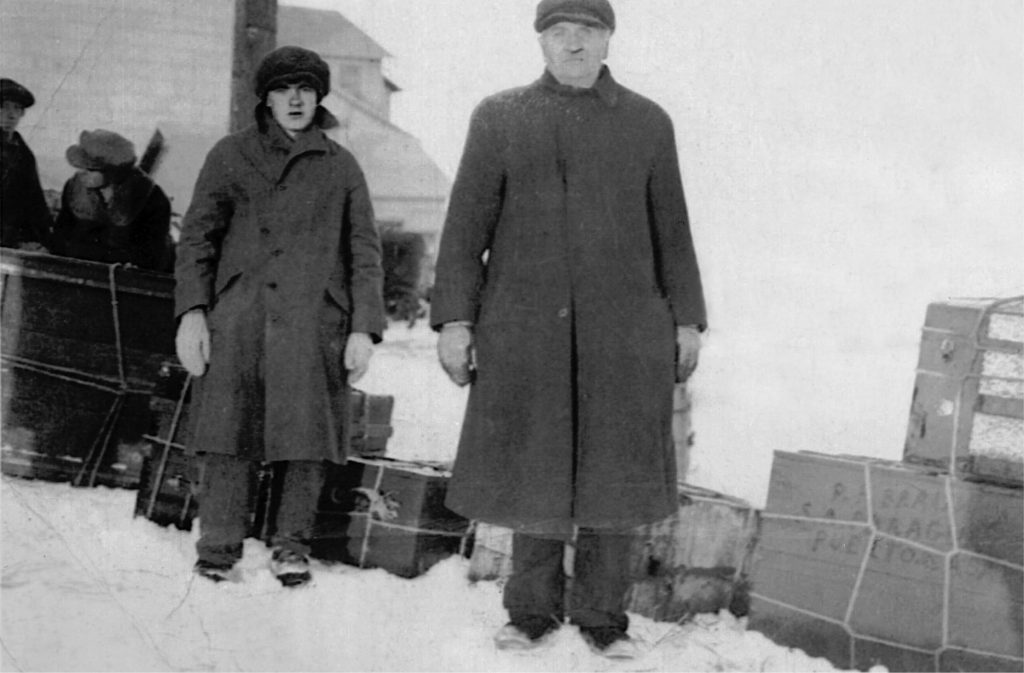
The family duly arrived in Puerto Casado on December 31, 1926, and everybody getting off the riverboat Apipe that night was astounded to see electric lights on the shore.5 The safe arrival was telegraphed to Manitoba, but the extraordinary challenges of the second part of the decision, immigration, became apparent within hours – namely, that almost nothing had been done in Paraguay to settle them on their land. The land reserved for the Mennonites in the interior had not been surveyed, the railway that was to provide access was not built, and the overcrowded camp life with its unrelenting heat and insects made life miserable.6 For the next sixteen months the immigrants were completely powerless to do anything about their situation, waiting either at Puerto Casado or one of the camps inland, with no income, inadequate temporary shelter, polluted water, poor diet, poor hygiene, and nearly impassable waterlogged landscape between them and the land they thought they had purchased. All these constituted a recipe for disaster, which arrived quickly.
Dysentery ravaged the tent camp from the start, taking small children almost weekly to the Catholic cemetery in Casado. My aunt remembered that at the time people were always singing. As a very little child she did not realize that she was experiencing a funeral every few days. Then the adults began to get sick, and poor medical care resulted in many avoidable adult deaths of typhus in what was known as “the Great Dying” (das grosse Sterben).7
In our family, immigration brought disaster almost immediately, as my grandmother became very ill. The German-speaking doctor serving the Casado village could do nothing, but said to my grandfather, “You have yourself to thank for this! What were you thinking bringing a pregnant woman with a long-standing abdominal hernia to this wilderness?” At the end she sang Gesangbuch hymn number 247: “Farewell, world! I am tired of you and want to go to heaven” (Welt ade! Ich bin dein müde, ich will nach dem Himmel zu).
Some of her last words, as repeated to me thirty years ago by a bystander at her deathbed, were: “Well, since you want it this way, I guess I will have to die.”8 These inexplicable words may have been addressed to God, and not the family, but they speak to the abject despair she felt as she surrendered to her fate. After saying farewell separately to each of her children, she died in agony, after fewer than ninety days in “paradise,” the primeval Chaco that turned out to be a grotesque parody of Eden, where every plant bore thorns and barbs. There was Grandpa, with six little children and no wife, in a strange climate, culture, and language, in a place he didn’t want to be, waiting for promises to be kept.
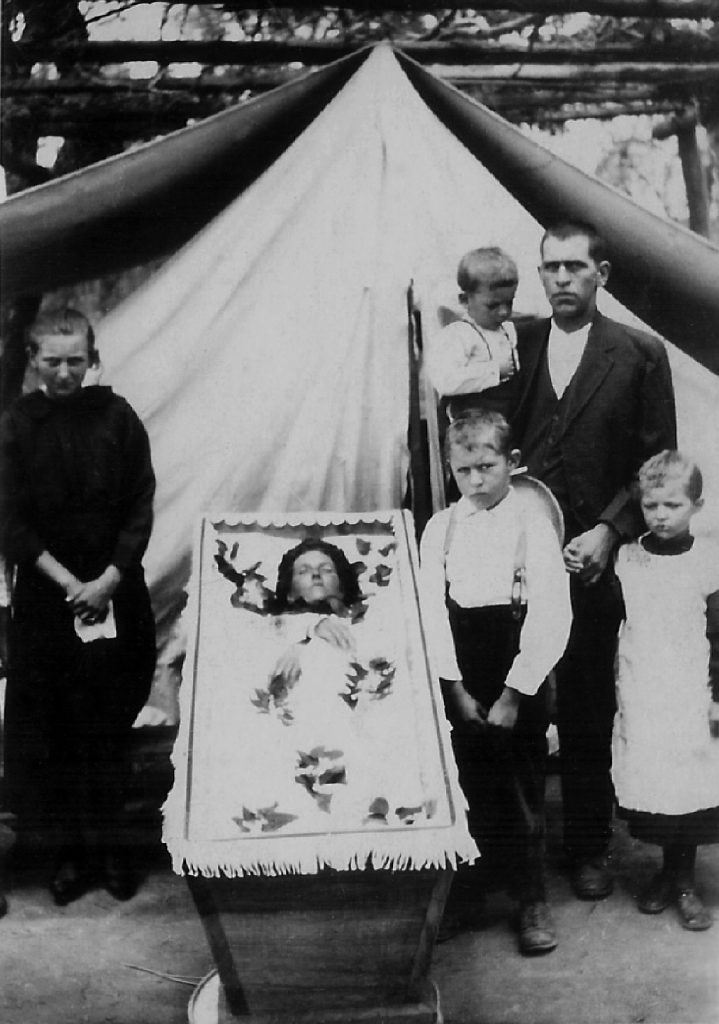
than three months in Paraguay. (ERNEST N. BRAUN)
An unusually capable man, he was installed as a camp manager, and later operated a supply store at Kilometre 135, while my father as an eleven-year-old played in the river with the other boys, rough-housing, fishing, and in general having a good time. In later years he regaled my mother with tales of outrunning the train, walking around the tent camp on stilts, and nearly drowning in the river trying to rescue another boy.
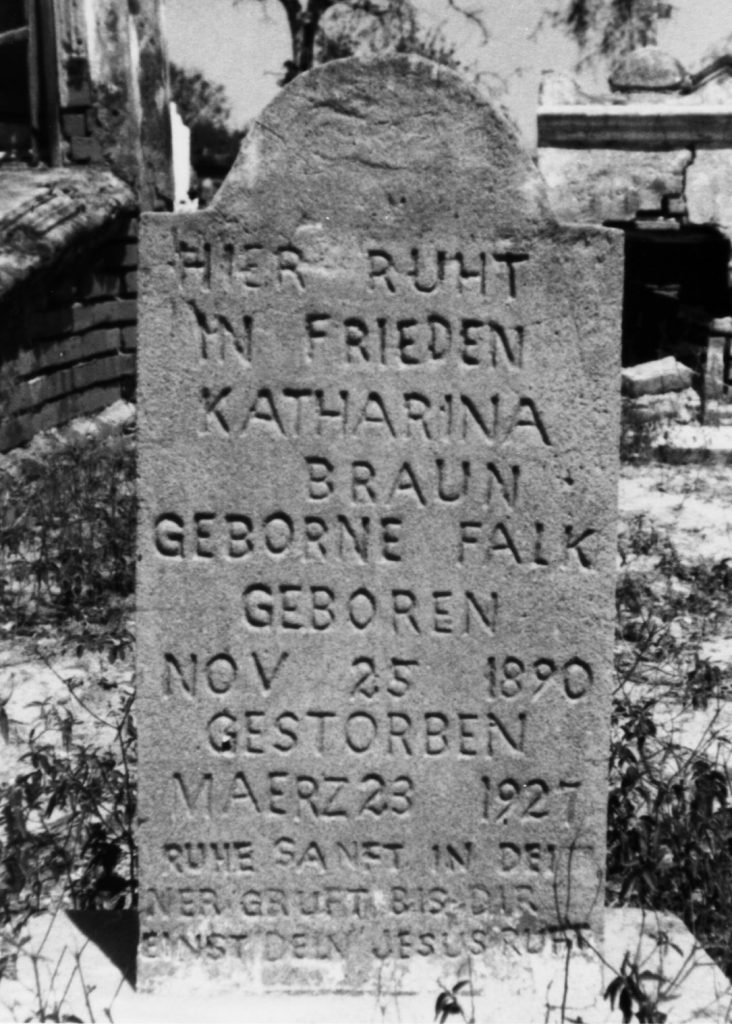
(ERNEST N. BRAUN)
On the other hand, Grandpa’s state of mind can be seen in a conversation he had with his youngest daughter Mary on an evening’s walk, possibly to see the grave of his wife in the Casado Catholic Cementary. Aunt Mary told me sixty-five years later that she had complained of not being able to sleep at night, and Grandpa had said, “If you can’t sleep at night, then you simply must pray, pray until you can.” Her headstone says: “Rest easy in your grave until your Jesus calls you.”
Grandpa’s sacrifices at emigration were the same as those of all the other emigrants, but as the immigration chapter began and his wife died, his spirit simply broke and all he wanted was to return to Manitoba. But his father still exercised some control over the finances, so he was trapped there, biding his time until his father decided in August 1929 to use his last resources to take those who wanted back to Manitoba.
Second Decision
The decision to return had it own unique complications, beginning in Paraguay. Since emigration to Paraguay had been on a collective British passport, return to Canada would require individual passports with all the personal details provided to the British consul in Asunción, as well as the signature of the group’s leaders that these persons were bona fide members of the group. After a stiff threat from the British consul, the settlement overseer Alfred Rogers reluctantly obliged, but the bishop declined, thus trapping everybody in Paraguay until many exhausted their means to return to Manitoba.9 That was the final straw. They had no choice but to stay with the group. That might go a long way to explain why 85 percent of the Manitoba group decided to stay.
Out of utter brokenness of spirit, disillusionment with the project and its leaders, both secular and religious, and despairing of pioneering in the wilderness, my grandfather obtained his passport in Asunción and joined two other siblings to return with their parents. The Brauns were fortunate: they were among the very few who had enough money to return without having to go into debt. Grandpa’s father could still buy each of his sons a quarter section of unoccupied Métis grant land in the Rural Municipality of De Salaberry, and here each son started over. When Grandpa obtained his quarter section, it was virgin scrub land, mainly bush, stones, and slough. Here they built a small house of saplings stacked between upright posts and covered with mud. Compared to the kind of house-barn he left in Alt-Bergfeld (now occupied by newly arrived Russlaender immigrants), it must have been heartbreaking to see.
That second decision kicked the entire Braun family down Maslow’s hierarchy of needs right back to the bottom, where food and shelter became the entire focus, the wealth accumulated over three generations was wiped out, and start-up from zero began in poor, unbroken land, isolated from familiar ground, and derisively called the Chaco by everybody else.
These losses, in addition to the heartbreak of losing his wife, left Grandpa, once known as Groote Bruhn, a shadow of his former self, to face starting over during the Great Depression, amid the ridicule of both those in Paraguay and nearby. Nor was the damage limited to him: my father’s life was disrupted, and instead of becoming a prosperous farmer, he was forced into day labour, and coming home from work one day he was killed at age forty by a drunk driver. Even my own childhood was impacted. Only when I finished high school, when two older siblings had already sacrificed school and postponed career for the family, did the consequences of the Braun family’s fateful decisions abate for my generation.
Conclusion
In view of the disastrous beginning in Paraguay, why did only about 15 percent of the Manitoba settlers despair and return?10 There is no easy answer. With both decisions, it was a matter of reaching a breaking point. Before the initial departure (emigration), the question was: how much compromise to principle can we live with before we take desperate measures and leave? Upon arrival in Puerto Casado (immigration), the parallel question was: how much misery and loss can we live with before we abandon principle and return to compromise?
The answers to these questions varied with each settler family. It should be noted that the families that emigrated were already the ones who had a high standard of principle, and a high tolerance for hardship, and, coming from poor land on the East Reserve, less to lose. It is difficult to discover what factors led some of these hardy pioneers eventually to give up, after sacrificing so much for principle. Who knows in advance what the breaking point of a person’s spirit is?
Today, I still have many relatives in Paraguay who are descendants of families whose spirit did not break. They survived and eventually prospered. As my great-uncle Abram Braun said to me in Loma Plata in 1973: “In the first generation it was death, the second it was need, and only in the third generation was it bread” (Die erste Generation erntete den Tod, die zweite die Not, die dritte das Brot).11 He did not address the fourth generation, but today they are prosperous, successful farmers, businesspeople, and professionals, attending universities abroad and living lifestyles identical to ours. So, although almost everything that could go wrong did go wrong in their wildly outrageous endeavour, the vast majority of the pioneers carried through despite the cost, supporting Alfred Rogers’s assessment in 1928 that “we will not find another people who would do what these Mennonites did.”12
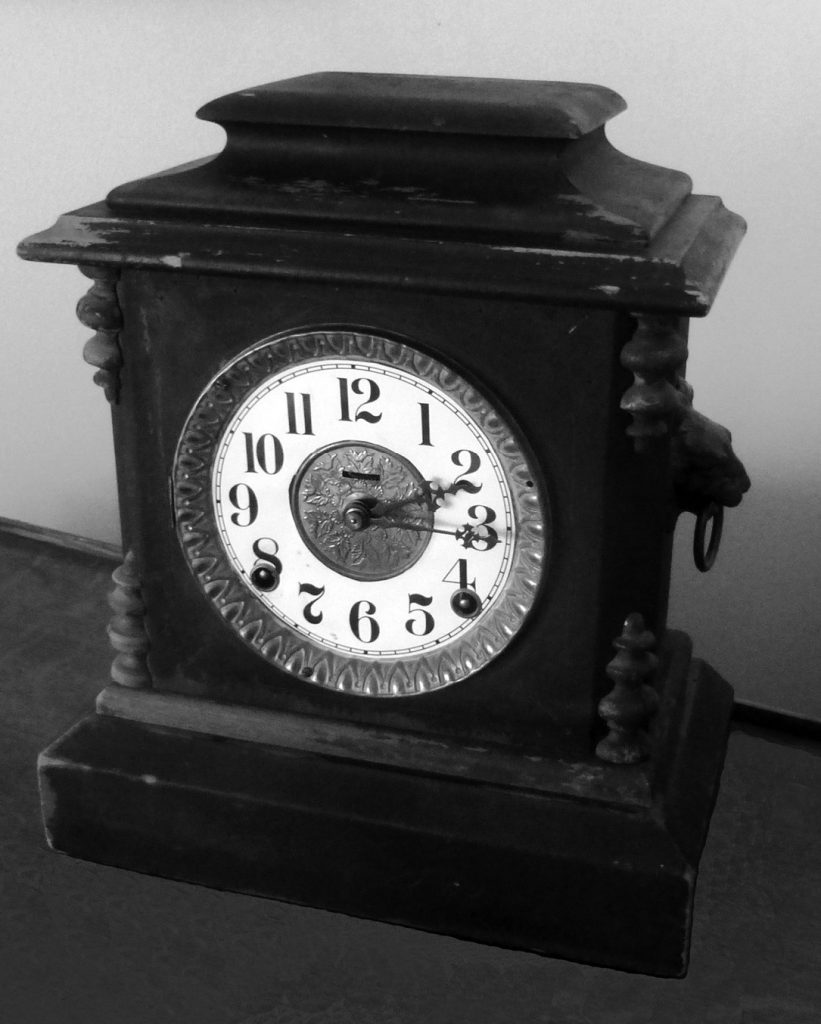
However, for our family I must conclude that while in the first decision, principle trumped compromise, despite the cost, in the second decision, the cost in death, loss, and disillusionment trumped principle, despite the compromise. Throughout Mennonite history, emigration on religious principle was absolutely irreversible, and if anyone did turn back, it was an unforgivable betrayal of that principle. That was the ultimate price of our return to Manitoba.
About forty years ago I bought an antique clock from a retired farmer near Grunthal, a Rückkehrer himself, who told me that he had emigrated in 1927, but disillusioned and broke, he could only return because somebody gave him the money, and although that person came back himself, he never asked for the money back. That person was my great-grandfather Jacob Braun. Broken in spirit and despairing of a future, my Braun family had compassion on another desperate family and demonstrated a greater principle: love thy neighbour as thyself. Whenever I see that clock on my desk, I am reminded of how I came to be here: by a return perhaps as costly to Grandpa’s spirit as the death of his wife. But I understand, and, within the bounds of Mennonite humility, I hold my head high.
- Articles and letters to the editor published in the Steinbach Post attest to the ridicule returnees faced. ↩︎
- Great-grandpa Braun was one of the motivating spirits of the emigrant group out of Grunthal. ↩︎
- Martin W. Friesen, Neue Heimat in der Chaco Wildnis (Altona, MB: D. W. Friesen & Sons, 1987), 137. ↩︎
- The village sale consisted of 3,512 acres, fourteen farmyards, a school, livestock, and machinery, offered at $75,508. The precise date of the sale has not yet been determined. ↩︎
- The Brauns travelled with the first group aboard the SS Vasari of the Lamport and Holt Line. ↩︎
- The promised railway was extended somewhat but was never built all the way to the colony. In time the Trans-Chaco Highway served as the link to the markets in Asunción. ↩︎
- Of 1,743 immigrants (including those who returned), 9.8 percent died in the first two years. ↩︎
- In Low German, “Na, wann jie daut soo welle, dann woa etj woll stoawe motte.” ↩︎
- Friesen, Neue Heimat, 308–11. ↩︎
- Friesen, Neue Heimat, 277. ↩︎
- An age-old German saying familiar to Mennonites. ↩︎
- Friesen, Neue Heimat, 360. ↩︎
